The following are biographical sketches and candidacy statements of the nominated candidates for the annual election of ECS officers.
Candidate for President | Candidates for Vice President | Candidates for Secretary
Candidate for President
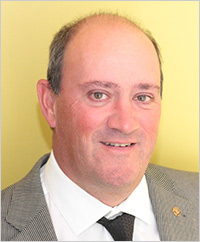 Stefan De Gendt is a scientific director at IMEC, Belgium (research center in the nano-electronics domain) responsible for research on chemistry and physics of exploratory materials. He obtained his doctoral degree from the University of Antwerp, Belgium. In 1996, he joined IMEC as a researcher in the Ultra Clean Processing group. His research topics included cleaning technology and analytical metrology for contamination control in CMOS processing. In 2000, he became group manager at IMEC, and program manager of IMEC Industrial Affiliation Program (IIAP) on high-k and gate metal materials. The goal of this program was the replacement of conventional SiO2 based gate dielectrics (by metaloxide high-k materials) and Si based gate electrodes (by metal materials) to allow further scaling of transistor technologies. In 2005, he took up responsibility for IMEC’s post-CMOS Nanotechnology program. The goal of this program was threefold. Firstly, the exploration of devices using 1D (nanowire like) architectures; secondly, the synthesis and use of carbon nanotubes for exploratory interconnect applications; and thirdly, the exploration of graphene synthesis and applications.
Stefan De Gendt is a scientific director at IMEC, Belgium (research center in the nano-electronics domain) responsible for research on chemistry and physics of exploratory materials. He obtained his doctoral degree from the University of Antwerp, Belgium. In 1996, he joined IMEC as a researcher in the Ultra Clean Processing group. His research topics included cleaning technology and analytical metrology for contamination control in CMOS processing. In 2000, he became group manager at IMEC, and program manager of IMEC Industrial Affiliation Program (IIAP) on high-k and gate metal materials. The goal of this program was the replacement of conventional SiO2 based gate dielectrics (by metaloxide high-k materials) and Si based gate electrodes (by metal materials) to allow further scaling of transistor technologies. In 2005, he took up responsibility for IMEC’s post-CMOS Nanotechnology program. The goal of this program was threefold. Firstly, the exploration of devices using 1D (nanowire like) architectures; secondly, the synthesis and use of carbon nanotubes for exploratory interconnect applications; and thirdly, the exploration of graphene synthesis and applications.
Currently, as a research director, he is responsible for material and process related research on a wide variety of exploratory materials for CMOS and Memory technology. Since 2003, he also is part time associated to the Katholieke Universiteit Leuven (KULeuven), department of Chemistry. He has been coaching more than 15 postdocs, Phd students (20+ graduated since 2006, 10 currently in progress), and research students (average of three per year). He has co-authored more than 400 technical papers in revered journals and is co-inventor of cleaning and gate stack process steps, resulting in several patent applications. He has been actively involved in the organization of international conferences (mostly with The Electrochemical Society; high-k gate stack, Carbon Nanotubes, graphene and III-V materials and Atomic Layer deposition from 2004 until today, but also served up to the role of general chair of IEDM. He is member of ECS DS&T and E&P committees and has been technical editor for the Journal of Solid State Science and Technology from October 2011 until he took up the role of Society Vice President in 2017.
Statement of Candidacy
Advancing science and technology is not just the mission of The Electrochemical Society—it should be the goal of every scientifically educated individual. In the past century, ECS has achieved its goals through encouraging research, dissemination of knowledge, and the education of its members. Education in Science, Technology, Engineering and Mathematics (STEM) of generations to come is a crucial pillar of our societal responsibility. With a network of over 8,000 scientists and engineers, ECS is invaluable for enriching people’s scientific and professional career. Expanding this membership base on a global level, leaving many opportunities for active participation by young, as well as established researchers from traditional and emerging countries should be our target. We should use our tools for dissemination of knowledge efficiently. Our vibrant conferences should further expand globally and bring science to the people, such that the world has access to updated knowledge and international experience. It is important to maintain and strengthen our publication pillar by raising the impact factor through definition of focus areas, critical reviews, and contributions by the leaders in technological domains. Pivotal in this are our publications and the pioneering role played with Free the Science. Only by opening and democratizing research can science more rapidly advance society. Sustaining further growth in ECS membership is crucial, yet it is equally important to make sure that our members feel engaged with the Society. Encouraging members to participate in conference organization, rewarding outstanding achievements, and bringing together technical experts to discuss emerging and established research will maintain the Society at the forefront of electrochemical and solid state science and technology for many years to come. Strong leadership is a prerequisite to develop content and innovativeness in a changing world, and if elected president, I will serve ECS and its members to the fullest of my capacities. Thank you for your consideration of my candidacy.
Candidates for Vice President
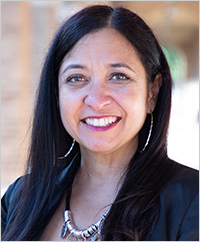 Gerardine (Gerri) Botte is a professor and the Whitacre Department Chair in chemical engineering at Texas Tech University with over 21 years of experience in the fundamental understanding and development of electrochemical processes. She is a visionary and a recognized leader in electrochemical science and technology. In 2014, she was named a fellow of the ECS for her contributions and innovation in electrochemical processes and engineering. Previous to Texas Tech, Botte was university distinguished professor and Russ Professor of Chemical and Biomolecular Engineering at Ohio University, the founder and director of the Center for Electrochemical Engineering Research, and the founder and director of the National Science Foundation Consortium for Electrochemical Processes and Technology—an Industry University Cooperative Research Center. She has 189 publications, including 58 granted patents. Botte also is an entrepreneur. She has been involved in the commercialization of technologies and has founded and co-founded companies. She received her PhD in 2000 (under the direction of Ralph White) and ME in 1998, both in chemical engineering, from the University of South Carolina. Prior to graduate school, Botte worked as a process engineer in a petrochemical plant; she was involved in the production of fertilizers and polymers. Botte received her BS in chemical engineering from Universidad de Carabobo (Venezuela) in 1994.
Gerardine (Gerri) Botte is a professor and the Whitacre Department Chair in chemical engineering at Texas Tech University with over 21 years of experience in the fundamental understanding and development of electrochemical processes. She is a visionary and a recognized leader in electrochemical science and technology. In 2014, she was named a fellow of the ECS for her contributions and innovation in electrochemical processes and engineering. Previous to Texas Tech, Botte was university distinguished professor and Russ Professor of Chemical and Biomolecular Engineering at Ohio University, the founder and director of the Center for Electrochemical Engineering Research, and the founder and director of the National Science Foundation Consortium for Electrochemical Processes and Technology—an Industry University Cooperative Research Center. She has 189 publications, including 58 granted patents. Botte also is an entrepreneur. She has been involved in the commercialization of technologies and has founded and co-founded companies. She received her PhD in 2000 (under the direction of Ralph White) and ME in 1998, both in chemical engineering, from the University of South Carolina. Prior to graduate school, Botte worked as a process engineer in a petrochemical plant; she was involved in the production of fertilizers and polymers. Botte received her BS in chemical engineering from Universidad de Carabobo (Venezuela) in 1994.
Botte has been an active member of the ECS since 1998, where she has served in several leadership roles, including board member, chair of Industrial Electrochemistry and Electrochemical Engineering (IEEE) Division, member of the Interdisciplinary Science and Technology Subcommittee, member of the Honors and Awards Committee, and other ECS committees. She started the outreach program of the ECS IEEE Division. The first activity took place at the 2006 ECS Cancun meeting. Since then, it has been held 16 times at different ECS meetings with at least 847 participants.
Statement of Candidacy
One of the things that makes me most excited about electrochemical and solid state science and technology is that it is a core platform that has applications in different aspects of our life. While exciting, there is still a lag in education about what electrochemical technologies can do. I believe that the ECS, being the premier solid state and electrochemical science and technology society in the world, will lead a paradigm change mitigating such an educational gap while enabling sustainable education in the field. If elected, I will lead the ECS to expand into programs that can explain to different audiences the importance and the fundamental principles of electrochemistry. For example, programs targeted to the next generation of scholars (STEM), industry, policy makers, and investors. During the biannual meetings, we could find opportunities for all this. Outreach programs can become a continuous event in our ECS biannual meetings to attract the next generation into electrochemical science. Such programs could include our ECS student chapters. Forums and sessions that discuss commercialization aspects of electrochemical-based technologies can become part of our programs and can help reach out to funding agencies, policy makers, and investors. I will help facilitate joint collaborations between the ECS, federal funding agencies, and industry to organize and sponsor symposia on topicals regarding frontiers and opportunities for electrochemical technologies.
I am fully committed and supportive of the ECS Free the Science effort. If elected, I will work with the ECS and members to raise the resources to minimize the costs burden of open access. It is important to continue to attract young authors to submit their best papers to our journals and to support raising starts in electrochemical and solid state science. If elected, I will help generate resources to increase the number of awards for young authors. In addition, I think it is essential to consider dissemination of knowledge to attract the next generation and to engage industrial and policy makers. With that respect, education-based apps can play a significant role. I will seek partnerships with our members and industrial sponsors to develop such opportunities.
I applaud the ECS diversity statement; the symposium on diversity and inclusion at the ECS Atlanta is an example of many other initiatives that can continue. I will lead the ECS to implement the best practices in diversity and inclusion and to seek collaboration with other professional organizations to support these efforts.
ECS is an integral part of my professional career, it is my family, in which I was accepted and welcome since I was a student, interacting since then with many distinguished scientists all over the world that today have become my peers and friends. It is an honor for me to be nominated for this position. I am looking forward to growing the ECS family and serving all of you.
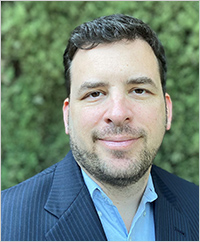 Adam Z. Weber holds BS and MS degrees from Tufts University, and a PhD from University of California, Berkeley in Chemical Engineering under John Newman. Dr. Weber is a scientist and leader of the Energy-Conversion Group at Lawrence Berkeley National Laboratory, Deputy Director of the Fuel Cell Performance and Durability (FC-PAD) and HydroGen consortia, and Thrust Coordinator at the Joint Center for Artificial Photosynthesis (JCAP). His current research involves understanding and optimizing fuel cell and electrolyzer performance and lifetime, including component studies using advanced modeling and diagnostics, understanding flow batteries for grid-scale energy storage, and analysis of solar-fuel generators. Dr. Weber has coauthored over 135 peer-reviewed articles (34 in the Journal of The Electrochemical Society), 10 book chapters, 27 ECS Transactions articles, developed many widely used models for fuel cells and their components, and numerous invited talks. His awards include a 2012 Presidential Early Career Award for Scientists and Engineers (PECASE), the 2014 Charles W. Tobias Young Investigator Award, the Battery Division student award, and the 2016 Sir William Grove Award from IAHE.
Adam Z. Weber holds BS and MS degrees from Tufts University, and a PhD from University of California, Berkeley in Chemical Engineering under John Newman. Dr. Weber is a scientist and leader of the Energy-Conversion Group at Lawrence Berkeley National Laboratory, Deputy Director of the Fuel Cell Performance and Durability (FC-PAD) and HydroGen consortia, and Thrust Coordinator at the Joint Center for Artificial Photosynthesis (JCAP). His current research involves understanding and optimizing fuel cell and electrolyzer performance and lifetime, including component studies using advanced modeling and diagnostics, understanding flow batteries for grid-scale energy storage, and analysis of solar-fuel generators. Dr. Weber has coauthored over 135 peer-reviewed articles (34 in the Journal of The Electrochemical Society), 10 book chapters, 27 ECS Transactions articles, developed many widely used models for fuel cells and their components, and numerous invited talks. His awards include a 2012 Presidential Early Career Award for Scientists and Engineers (PECASE), the 2014 Charles W. Tobias Young Investigator Award, the Battery Division student award, and the 2016 Sir William Grove Award from IAHE.
He is a fellow of The Electrochemical Society and has served as chair of the Energy Technology Division (and thus ECS Board Member) and San Francisco Section and served on various key committees. He also has been a key organizer for multiple large ECS initiatives, such as the E2S symposia and ECEE meetings. In addition, he has co-organized more than a dozen ECS symposia and coedited various ECS Transactions volumes. Weber has guest edited on four special issues of JES.
Statement of Candidacy
Electrochemical and solid state science is poised as the next generation foundation of our energy and chemical lives. While The Electrochemical Society is an agent of that transition, influence is being eroded by other societies and publishers. If elected, I will work to reinvest in key ECS tenets and energize the society towards sustainable Free the Science. Such efforts include increased recognition, publicity, and visibility of member accomplishments (including student chapters); creation of defined honorary symposia; formation of opportunities related to industrial interactions and career guidance with technical and nontechnical masterclasses; and outreach towards the younger scientists across the globe, where an award symposium will be established. We are at a crossroads in terms of metric-driven research and short-term technology versus sustained scientific innovation and open access. I plan to enhance the Journals’ trends of focus issues, perspectives, opinions, and reviews by launching a series of ECS branded publications (including possibly dynamic publishing through ECSArXiv that leverages today’s internet resources) to emphasize those aspects upon which we have core domain knowledge and expertise.
I have a deep love for The Electrochemical Society, as it is not only my scientific home, but also a family. It is a rare institution that knows no strong discipline boundaries and involves a melding of industrial, laboratory, and academic researchers. If elected, it is my intention to expand upon this strength by welcoming and increasing diversity throughout our ranks. This is something that I believe in strongly as witnessed by my own research group. I plan to grow the membership of younger scientists and others through leveraging our strong reviewer pool and meeting attendees. Being a National Laboratory scientist and working at leadership positions within different large research efforts affords me a perspective of the opportunity presented when one crosses between science and engineering and academia and industry. These are key traits of ECS that should be heralded and emphasized. Having served on various ECS committees and symposia and speaking to the membership candidly, I understand what needs to be done. It is an honor for me to be nominated for the vice president position, and if elected, I plan to serve ECS and its membership to the best of my abilities.
Candidates for Secretary
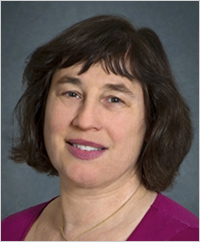 Marca M. Doeff is a senior scientist in the Energy Storage and Distributed Resources Division at Lawrence Berkeley National Laboratory, where she is a principal investigator in electrochemical energy storage programs funded by the U. S. Department of Energy. She earned a BA in chemistry from Swarthmore College in 1978, and a PhD in inorganic chemistry from Brown University in 1983. She is a fellow of The Electrochemical Society and the Royal Society of Chemistry, and is currently chair of the Battery Division of ECS. Her main research interests concern materials for rechargeable lithium-ion, sodium-ion, and solid state batteries. She has published approximately 140 peer-reviewed papers on these and related subjects, many in ECS journals.
Marca M. Doeff is a senior scientist in the Energy Storage and Distributed Resources Division at Lawrence Berkeley National Laboratory, where she is a principal investigator in electrochemical energy storage programs funded by the U. S. Department of Energy. She earned a BA in chemistry from Swarthmore College in 1978, and a PhD in inorganic chemistry from Brown University in 1983. She is a fellow of The Electrochemical Society and the Royal Society of Chemistry, and is currently chair of the Battery Division of ECS. Her main research interests concern materials for rechargeable lithium-ion, sodium-ion, and solid state batteries. She has published approximately 140 peer-reviewed papers on these and related subjects, many in ECS journals.
Statement of Candidacy
Electrochemistry has never been more relevant than today to solving the world’s grand challenges, such as global climate change and water scarcity. This presents a wonderful opportunity for ECS to reach out to the increasing numbers of researchers all around the world interested in solving these problems. While ECS has been my intellectual home since 1991, and ECS meetings and publications the first resources I tap into to keep up with my field, some researchers may not be aware of all that our Society has to offer. It’s my goal to help ECS reach out to electrochemists of every stripe—young and old, those in industry, academia, and national labs, everywhere around the world. The Free the Science campaign, with the ultimate goal of making ECS journals platinum open access (i.e., with no author processing charges), is a step in the right direction. We should continue to modernize our approach to make ECS journals appealing places to publish to all members and those contemplating membership. Likewise, the programs at ECS meetings have always been excellent and attendance is growing. To continue this upward arc, we should assess what gaps there are and try to fill them in; for example, how can we generate content that appeals to industry as well as academia? Many professional societies now have overlapping interests with those of The Electrochemical Society, but only we are the one-stop shop for electrochemical science—everything from water/energy nexus, batteries and fuel cells, photovoltaics, semi-conductors, corrosion, electrodeposition, and so on. This puts us in a very strong position. It’s an honor and a privilege for me to run for office of secretary of this venerable society, and, if elected, I’ll do my best to ensure the continuing success of ECS.
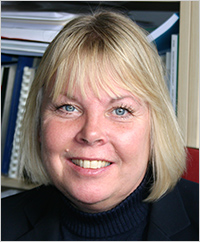 Sannakaisa Virtanen is professor of surface science and corrosion at the Department of Materials Science of the Friedrich-Alexander University Erlangen-Nürnberg (FAU), Germany. She studied metallurgy at the Helsinki University of Technology, Finland (MS), and then joined the Swiss Federal Institute of Technology, ETH-Zurich. After receiving her PhD from ETH, she was employed as a senior scientist at the ETH, with research stays at the Brookhaven National Laboratory, USA and at the McMaster University, Canada. In 1997, she was elected assistant professor at the ETH-Z, Department of Materials, and then joined FAU Erlangen as professor in 2003. In 2006, she was visiting professor at the University of Helsinki (Finland), and in 2008 visiting professor at the Institute of Advanced Energy of the Kyoto University (Japan).
Sannakaisa Virtanen is professor of surface science and corrosion at the Department of Materials Science of the Friedrich-Alexander University Erlangen-Nürnberg (FAU), Germany. She studied metallurgy at the Helsinki University of Technology, Finland (MS), and then joined the Swiss Federal Institute of Technology, ETH-Zurich. After receiving her PhD from ETH, she was employed as a senior scientist at the ETH, with research stays at the Brookhaven National Laboratory, USA and at the McMaster University, Canada. In 1997, she was elected assistant professor at the ETH-Z, Department of Materials, and then joined FAU Erlangen as professor in 2003. In 2006, she was visiting professor at the University of Helsinki (Finland), and in 2008 visiting professor at the Institute of Advanced Energy of the Kyoto University (Japan).
Sannakaisa Virtanen has published more than 240 peer-reviewed publications. She is the 2008 recipient of the H.H. Uhlig Award of the National Association of Corrosion Engineers (NACE). She was elected chair of the Gordon Research Conference on Aqueous Corrosion in 2016. She was elected a fellow of The Electrochemical Society in 2018.
Virtanen is an active member of ECS and has served the Society in a number of committees, including service in the executive committee of the European section and the Corrosion Division. As chair of the Corrosion Division she was member of the ECS Board of Directors. She has co-organized numerous symposia at ECS meetings.
Her research areas include elucidation of reaction mechanisms at solid/liquid- and solid/gas-interfaces: passivity, oxidation, corrosion, and degradation behavior of advanced metallic materials, as well as their surface modification and functionalization. For this, advanced electrochemical and surface analytical tools are being employed. A strong focus her recent research activities is on the corrosion behavior of metallic materials used in biomedical applications, including biodegradable metals.
Statement of Candidacy
It is an honor to be nominated for the position of secretary of ECS. As an engaged, long-term member of this prestigious society, it would be a pleasure to further serve the Society and be actively involved in its future development.
Since my first ECS experience in Chicago 1988, the yearly ECS meetings became a standard entry in my calendar. Attending first as a speaker, then later as symposium organizer, section and division officer, as well as member of different committees, I had ample opportunity to interface with colleagues from different fields of electrochemistry. In turn, ECS had a strong impact on my professional development: the Society easily gives access to active participation and integration on virtually all society levels, allowing for the development of a strong, international professional network.
For me, ECS stands for electrochemistry-related research and education in energy, sustainability, environment, and health—and other fields of key societal challenges. Therefore, I would be glad to contribute to the near future of ECS in further promoting electrochemical research and education. As a past ECS division chair and member of the Board of Directors, but also as a university professor, I am convinced that professional networks, which trigger and foster critical scientific discussions, are the key for the progress of science.
As secretary of ECS I would do my best to serve its members, to maintain and nourish a platform to drive science at the forefront of electrochemical science and technology to tackle the grand challenges of our future.
